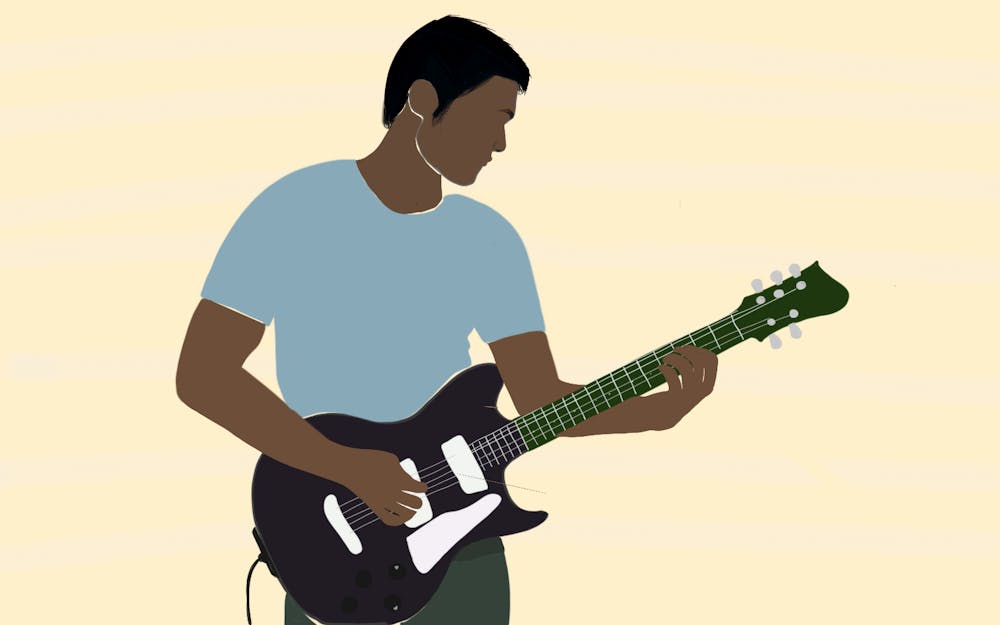As I reminisce on my first year at IU, I recall how, even before enrolling for classes, I knew I was interested in taking at least one of the rock music history classes offered. My older brother had told me how much fun he had taking them, and I got curious once I saw all the Spotify playlists he had downloaded for the class.
Unfortunately, I couldn’t take any of the classes my first semester. As I was enrolling this past fall for my second semester, though, I remember revising my plan on one of the couches in my floor lounge at Forest Quadrangle and scrambling to replace the courses that had filled up just days before my assigned enrollment date. Almost out of instinct, I swapped one of the filled classes for History of Rock Music II.
The first of the three rock history classes begins with the earliest recordings of rock music and goes all the way until the late 1950’s; the second focuses on the “classic era” beginning in 1964 and the last covers the 1970’s and 1980’s. My brother, having taken all three of them, suggested that the second section would be a good starting point. Sure, it would mess with the chronology, but he felt I’d enjoy it more because it included revolutionary, iconic bands I was already familiar with.
On the first day of the class, I wasn’t sure of what to expect. However, as soon as Professor Andy Hollinden showed his great enthusiasm for teaching about music history, I was hooked. Not only that but seeing how the lectures incorporated listening to music during class time, I knew it was probably going to be the most fun I’ll have in Ballantine Hall.
Not only did I get to listen to music during class, but I also got to do it for homework. I would listen to the music on my walks around campus and it made the harsh, cold weather more bearable. My walks listening to music also served as interesting periods of reflection. I often recognized unique aspects of songs highlighted in lectures, and I would practice active listening and pick apart the instruments I heard to see how they all worked together, which informed me a lot as a musician. There were many instances where the professor advised us to pay attention to what each musician was doing to complement each other in a recording, and I tried to do just that.
The first two lectures of the semester were a package deal focused solely on the work of The Beatles and the beginning of the so-called “British Invasion” of America. Growing up with a father who is the closest thing to a living, breathing music encyclopedia in my family, I thought I knew most of the important things about the Beatles. I quickly found out I was wrong. Perhaps the most interesting thing I learned in the class that stuck with me was the large role psychoactive drugs played in their career.
I was also impressed by the rich history behind the Beatles’ American counterpart, The Beach Boys. I will confess, before the class I simply knew them as the guys who made “Surfer Girl” and “God Only Knows,” but I was unaware of their leader Brian Wilson’s personal struggles and utter genius, or drummer Dennis Wilson’s relationship with Charles Manson.
The Beach Boys were a group I ended up re-discovering when taking the class, and now they have become one of my favorite bands. As the class went on, I compiled all my favorite songs featured in the class into a playlist. I think there are six or seven songs by the Beach Boys that appear in succession on the playlist, which is a testament to how much I ended up liking their music.
My rock history lectures started at 4:45 p.m. on Tuesdays and Thursdays and ended at 6 p.m. Usually I would grab dinner at the Forest dining hall with my friends around 15 or 30 minutes after class, and I would frequently bring stories from my lecture to the table.
After taking off my noise-cancelling headphones that were playing music from the class’s listening list, I would often talk about a new band I discovered or an interesting or shocking fact I learned about a musical act.
I would also frequently write down some side comments the professor made, whether it was during one of his interesting philosophical rants or his short stand-up comedy routines. One moment he would talk about how it’s okay to occasionally feel human and imperfect, and the next he’d be doing a funny impression of Mick Jagger trying to avoid a heated argument with James Brown.
I think the most important aspect I learned from this class was the ability to appreciate music and become a better listener. It was a very fun experience that now motivates me to look for more courses out there that suit my interests that aren’t related to my major.
Joaquin Baerga (he/him) is a sophomore studying journalism.






